This post is part of a larger deep dive
Curious about the role of engrams in To the Moon? Check out To the Moon Explained!
Or read the full To the Moon article!
This post is part of a larger deep dive
Curious about the role of engrams in To the Moon? Check out To the Moon Explained!
Or read the full To the Moon article!
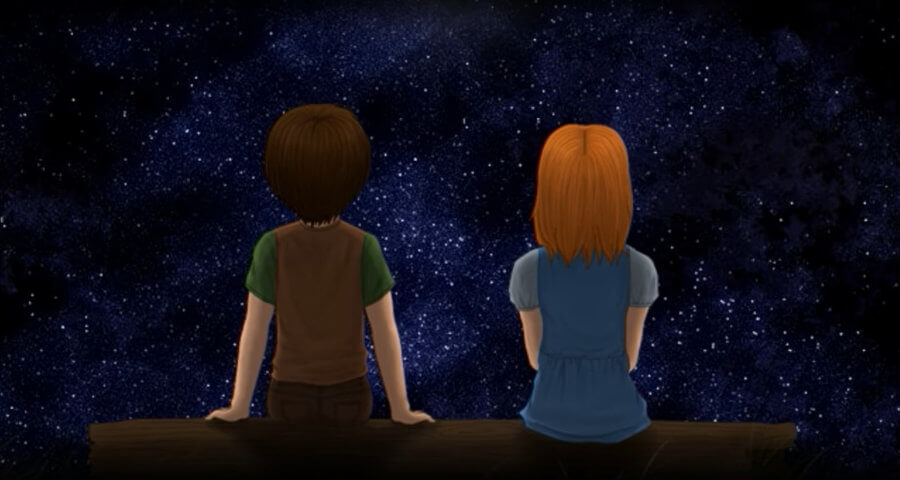
OK, I’ll tackle To the Moon asking a series of questions that will hopefully lead to a logical conclusion at the end of the article.

Short answer: they cannot.
Dr. Rosalene and Dr. Watts are no genies. What happens is that they use their patients’ own desires (unconscious or otherwise) to make up an alternate life story in their patients’ minds.
For that, they make use of a machine that generates a new mental life of the patient, where the desire dictates the patient’s behaviour. That life is transferred to the actual patient, so that all memories are replaced with the artificial memories generated by the machine.
If you have read the section on engrams above, this shouldn’t sound too outlandish.
After all, even though engram research at the neuronal level has only been applied to animals so far, it is not a stretch to think that one day we will possess the technology to alter memories in humans as well.
Presumably, the machine that Dr. Rosalene and Dr. Watts use to create/erase memories in their patients does pretty much the same thing as what scientists have done to the rodents. That is, the machine might be looking for engrams (the physical substrate of memories in the brain), and once it detects the correct engrams, it proceeds decoding them into images that Rosalene and Watts can actually visualise.
When they transfer wishes to their patients, they are creating artificial memories, just as scientists have been able to do with rodents.
Similarly, deleting memories can be achieved by inhibiting the engram neurons of the to-be-deleted experience.
So, I see the part where River’s memories are deleted from John’s memory as simply probing any events that contain River’s engram, essentially removing her from those events.
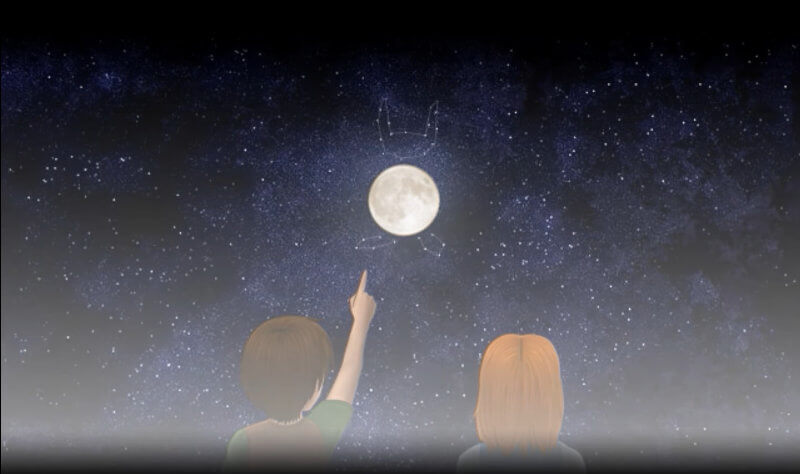
John’s last wish was to go to the Moon. Despite not knowing the reasons for such a wish, the two scientists attempt to implant this wish into John’s earliest memories.

When the scientists try to access one of Johnny’s childhood memories, they hit a dead end. Johnny’s earliest memories are distorted and incomplete. Rosalene concludes that this early memory isn’t linking with the other memories for construction.
They thought it was a glitch, so decide to implant the wish to go the Moon on the earliest memory they could access. However, when they did that, they realised Johnny showed no desire whatsoever to go the Moon. In fact, his memories remained exactly the same. No matter how much Rosalene and Watts tried, the implantation of the desire to go to the Moon simply would not have any effect.
At some point, Rosalene cogitates:
“A secondary condition for the desire was changed in the process. Only then, would the same desire produce two different outcomes at two different points in time. […] If there’s anything that could’ve caused the core to change, she [River] would be the top suspect.”
So, Rosalene reasons that something more potent is overwriting the transferred wish and that River is probably the reason that the desire has changed.
It all boils down to what happened during those early years of Johnny’s life that the scientists cannot access.
Remember, Johnny had been given beta-blockers, which disrupted his very early memories.
Luckily, Watts managed to get hold of the “reconfiguration frequencies” that would allow them to get past the blockers and access those early memories.
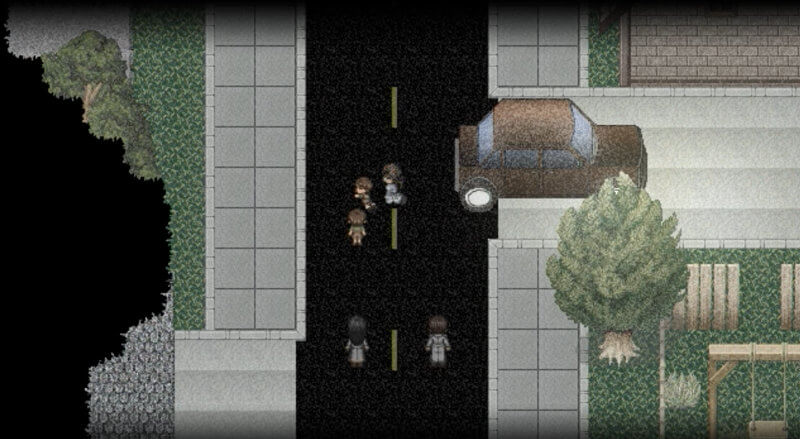
When they are finally able to break the barrier formed by the beta-blockers they come across a memory in which Johnny had a twin brother called Joey. Joey is accidentally killed by their mother, leaving her extremely depressed.
To quell the anguish of losing her preferred son, she gives Johnny beta-blockers, which has the effect of erasing Johnny’s memories up to the time of the accident. There is an interesting parallel with research on mice here. As reviewed above, some research has shown that admistering a protein synthesis inhibitor called anisomycin induces memory loss shortly after fear learning training.
Now, the mother’s intention with administering the beta-blockers to Johnny has been a topic of much debate.
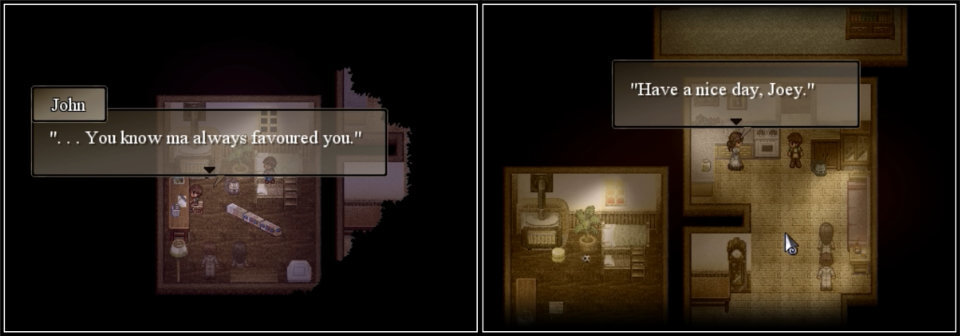
Johnny’s mother had a clear preference for Joey – this is very obvious during a conversation between Johnny and Joey in the bedroom. By erasing Johnny’s memories with the beta-blockers, Johnny’s mother could pretend that Joey hadn’t died, since Johnny was his twin brother. At some point, she started calling Johnny, Joey.
Terrible, I know. But it is corroborated by the conversation between Rosalene and Watts:
Watts: “… What about their [Johnny’s and Joey’s] mother?”
Rosalene: “I don’t think she took the beta-blockers. She seems to have gone a little cuckoo. At least, I don’t really think she called Johnny ‘Joey’ as a nickname.”
Watts: “But if she then takes Johnny for Joey, what about Johnny himself?

One of the critical memories that was erased in the process is the memory of a carnival, where Johny meets River for the first time.
Rosalene and Watts witness this encounter. At some point, Johnny promises River that if they ever get separated, they will “regroup” on the Moon.
Sadly, a few days after the carnival, Johnny’s mother kills Joey by accident, and gives beta-blockers to Johnny to prevent any recollection of this tragic event. Unfortunately, the beta blockers erase all memories from his childhood up to the point of the accident, including the encounter with River a few days earlier.
So, when Johnny meets River at school, he has genuinely no memory of ever having met her, and thinks this is the first time they are actually meeting.

Clearly, River wants Johnny to know that they had previously met. She is seen obsessively crafting paper bunnies. Remember, at the fair, River and Johnny played a game where they try to find a constellation in the shape of an Easter Bunny.
They notice a cluster of stars forming the ears and legs of the bunny, with the moon forming its big belly.
So the paper bunnies River leaves behind in the house are meant to be hints to jolt Johnny’s memory of the encounter at the fair. One particular bunny appears particularly significant to River: the bunny with a yellow body, and blue everywhere else. This bunny is a representation of what they saw together as kids, the yellow belly being the moon, and the blue body being the sky.
Nevertheless, it still seems rather odd that River would not say anything at all, even when it started to hurt their marriage, and making both miserable.
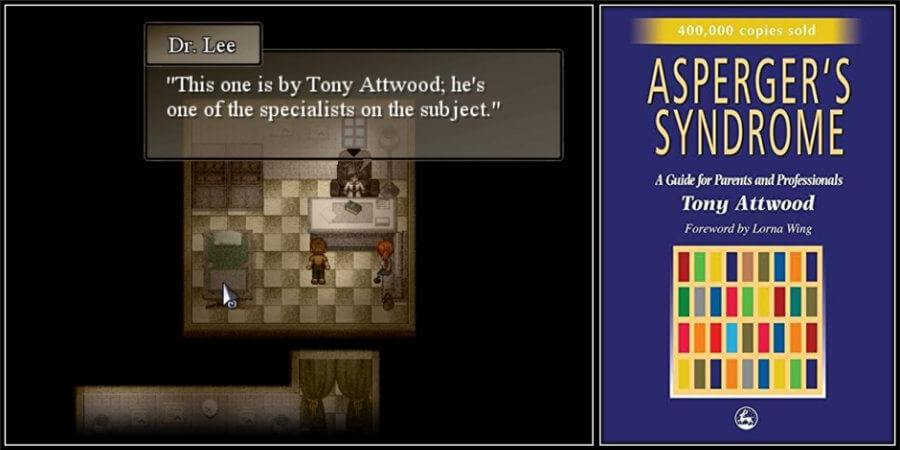
The explanation seems to be that River may have Asperger’s syndrome.
When River and Johnny visit the doctor, River asks the doctor if he has any books about her condition. The doctor gives River a book written by Tony Attwood, and says he is a specialist on the subject.
Well, Tony Attwood is an actual British psychologist with a research focus on Asperger’s syndrome and has written many important books about the disorder (see figure above).
Asperger’s syndrome falls under the broad umbrella of autism spectrum disorders. Some of the most common symptoms include difficulties with social interactions, and problems with communication, language and thinking.
River was in poor health during their later weeks of their marriage. When River was bedridden, Johnny was planning to sell the house to cover the medical bills and for River to be operated. Thus, it is implied that she also had a terminal disease, maybe cancer.

Now, more relevant to River’s autistic condition, she refused medical treatment because she wished John to keep the house, particularly the lighthouse (that she calls Anya) so he can tender to it when she dies.
This fascination with lighthouses is explained during River’s and John’s first encounter at the fair.
When River was a child, she had the belief that stars were billions of lighthouses stuck on the sky. They could all see each other and wanted to talk to one another, but they could not, since they were too far apart to be able to communicate. So the lighthouses could only use their lights so that the others, and River, knew they were there. River tells John that the reason the lighthouses were also shining at her was because she wanted to befriend a lighthouse one day.
Note the focus on communication, which may represent River’s attempt at (and long for) social interactions. I believe this partly explains why River never really directly confronted Johnny about their first encounter at the fair – she simply struggled to express and communicate her feelings and frustrations.
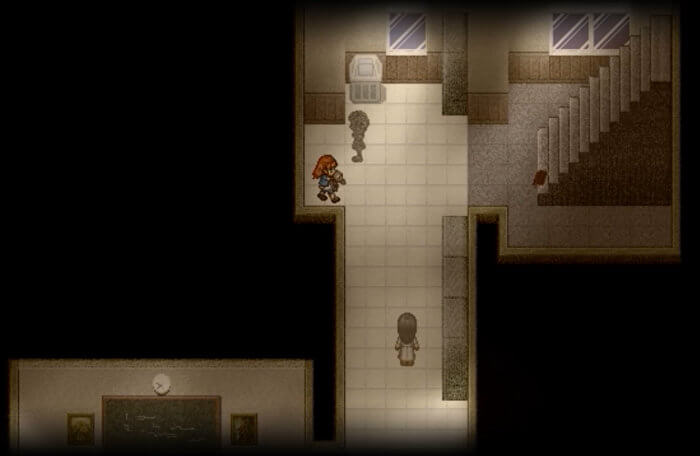
Rosalene concludes that the only way they can “send” John to the Moon is if he’s sufficiently motivated to go and that means removing River from John’s early memories. Remember, none of the memory implantations in his early childhood were a motivation enough to alter the course of John’s history.
When Watts protests, Rosalene reminds him that they are legally bound by the contract to fulfill John’s wish to go to the Moon, which they only can by erasing the memories of River.
But you see Watts argument, right? The only reason John wants to go to the Moon is because of River. If they remove River from the picture, there is no point of John going to the Moon. To Watts, John would be happier in a life where he had met River and not go to the Moon, so why removing her?
The reason why Rosalene thought River needed to be out of the picture has puzzled me for days…
But I think I get now what she was trying to do.
Let me explain.
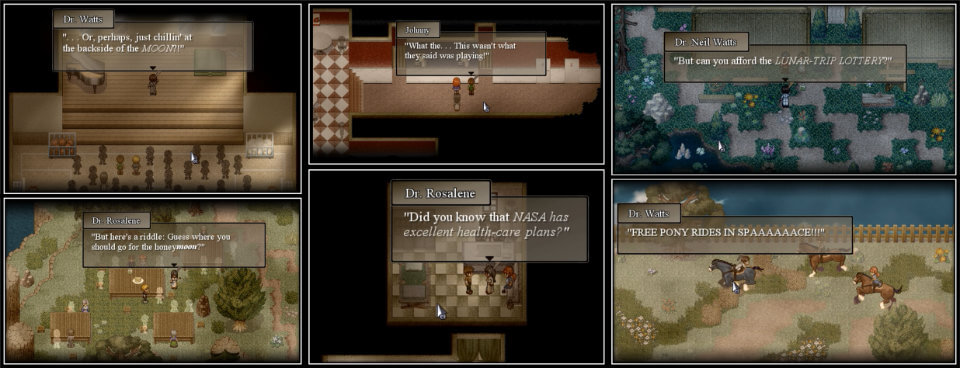
Johnny promised River he would meet her on the Moon if they ever got separated, which happens after River dies.
Now, when they try to transfer a desire for Johnny to go to the Moon, it doesn’t work.
But why should it work anyway?
After all, Johnny will not want to go to the Moon because River is in his life, and Johnny prefers to be with River than not to be with her.
However, after River dies, the memory of their initial encounter at the fair still lingers in his subconscious.
And it is River’ death that triggers the retrieval of this unconscious promise to regroup in the moon, causing John’s inexplicable wish to go the Moon.
So, Rosalene has the idea to “remove” River from his memories.
Now, from here on, there are two versions, both of which could be true, and it relies on whether or not memories of River are completely erased.
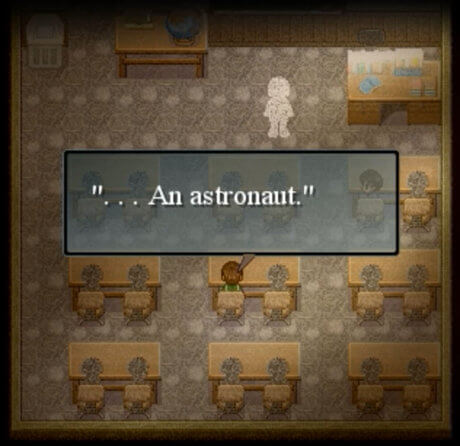
Version 1: The memory of meeting River at the fair is preserved
With this version, we are assuming Rosalene removed the memories of River after the encounter at the fair.
So, the encounter at the fair still took place.
After the fair, Johnny and River never meet again, so the promise he had made to her about reuniting in the Moon in case they never saw each other again is unconsciously stored in his brain.
Thus, by removing River from Johnny’s memories (but keeping their encounter at the fair), Rosalene is using River’s absence to trigger Johnny’s unconscious desire to go to the Moon and keep his promise to River.
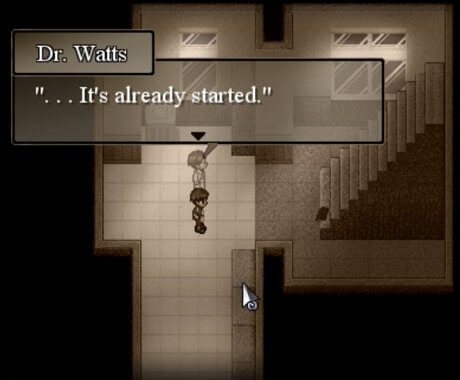
Version 2: All memories of River are deleted from John’s brain
Here we assume that Rosalene erased every single memory trace of River from John’s brain, including their meeting at the fair.
Now, I don’t think there is any evidence to support this version, since the memories that have been erased are shown in temporal order, starting from when Johnny meets River in the school’s staircase, then the cinema date, the horse-ride, the marriage proposal at the lighthouse and so on.
Of course you could argue that if River and Johnny’s encounter at the fair wasn’t deleted then Johnny would have somehow remembered meeting River. So, the fact that he did not recognise River when they met at NASA is evidence that no trace of River was present in John’s brain whatsoever.
However, surely River would have looked very different from when she was 6 years old. Furthermore, remember that River never told Johnny her name during their encounter at the fair, so Johnny wouldn’t be able to associate the name River with the NASA’s newly recruit.
So, in my view, the promise he had made to River wasn’t deleted and that was what Rosalene decided to use as trigger to arouse Johnny’s desire to want to go to the Moon.
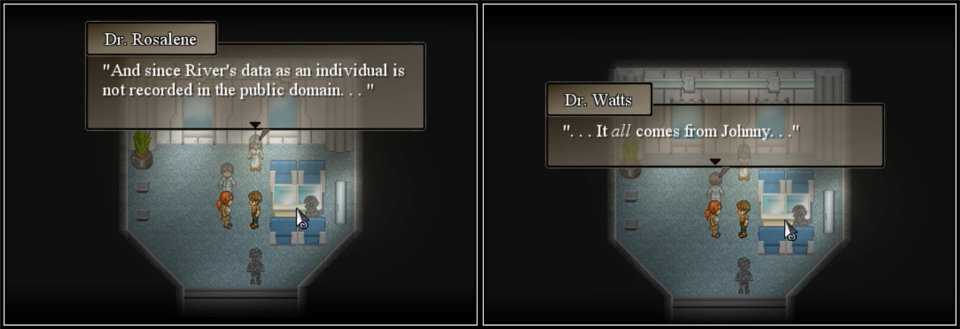
One thing the game gets often criticised is Rosalene’s logic of getting rid of River, hoping River would magically return and be with Johnny.
Most people discard this as a very fortuitous coincidence. After all, River wasn’t even in the same school as Johnny so she wouldn’t have been influenced by his decision to go to the Moon.
So, not only River would need to want to become an astronaut, would need to have a desire to go to the Moon, would need to apply at about the same time as Johnny did, would need to be able to get into NASA, and would need to be assigned to Johnny’s team.
That’s a lot of woulds!!! What are the chances of that happening?!?
Well, here is where people get it wrong, in my opinion.
We are assuming we cannot control River’s decisions, since it’s up to her what she does with her life.
That’s true.
However, River in Johnny’s mind isn’t the real River. In fact, nothing in Johnny’s mind is real. Everything has been fabricated by the machine. To be more precise, the machine generates Johnny’s new life based on Johnny’s desire and consequent response to that desire.
This is key in understanding Rosalene’s hunch. Johnny’s subconscious has still registered the encounter with River at the fair, and the promise he had made in case he “gets lost”. It is Johnny’s unconscious that is driving his desire to meet River on the Moon, and the machine works towards that goal. River is introduced in Johnny’s memories exactly where she needs to be – at NASA, training to become an astronaut for a Moon expedition, where she will be able to be with Johnny.
So, in my opinion, Rosalene’s hunch was very much spot-on!
Comatose patient, Johnny, had an inexplicable wish to go to the Moon, and hire Dr Rosalene and Dr. Watts to use their special machine to make him believe he did.
As the scientists later learn, Johnny had met his later-to-be-wife River at a fair when they were children, where he promised her to regroup on the Moon in case they ever got separated. After Johnny’s brother is tragically killed, Johnny is given beta-blockers that have the effect of erasing most of his memories, including the encounter with River.
River and Johnny eventually marry each other. However, River, who appears to possess a form of autism, never mentions their first encounter as children, and is upset that Johnny does not remember it.
The scientists realise that transferring the wish to go the Moon will not work because Johnny doesn’t want to be apart from River. So, Rosalene has the clever idea of removing River from Johnny’s memory, so that Johnny’s unconscious promise he made to River (that they would regroup on the Moon) could drive his desire to become an astronaut and want to visit the Moon.
In this alternate (mental) life, Johnny becomes an astronaut at NASA, and is later introduced to fellow-astronaut River, who is a product of Johnny’s desire to meet with River on the Moon.
While I acknowledge the poignant story-line and interesting script, I found that, as a video game, To the Moon lacks in many critical aspects. The poor game mechanics, lack of interesting puzzles and laconic dialogues certainly took my enthusiasm away from the game. Furthermore, the lack of emotional expressions and absent voice acting in a game that is supposed to evoke deep emotions makes me wonder if perhaps a different medium would have been more suited.
To the Moon inadvertently touches on one of the most fundamental problems in philosophy of mind.
Can it be that our consciousness is solely the product of a bunch of engrams with a physical location in the brain? Is it possible that experience, thoughts and desires are simply the activation of a bunch of these engrams? Can it really be that easy to manipulate and modify one’s memories by simply activating/inhibiting these engrams? That is, at least, the premise of To the Moon, and what gives Rosalene and Watts a paycheck.
This is surely a very provocative thought, but also an uncomfortable one. After all, messing up with stored content in the brain has stopped being purely the work of fantasy and science fiction. Manipulating and creating artificial memories in the lab is now child’s play, at least in rodents.
But perhaps it is only a question of time until the same could be done in humans.
Yikes! I don’t know if I should be fascinated or terrified…
Maybe both?
Yeah, definitely both!
See you in the next article!
Journal articles
Josselyn S.A., et al. (2015) Finding the engram.
Josselyn S.A. & Tonegawa, S. (2020) Memory engrams: Recalling the past and imagining the future.
Ramirez et al. (2013). Creating a False Memory in the Hippocampus.
Vetere et al. (2019). Memory formation in the absence of experience.
Ryan, T.J. et al. (2015). Memory. Engram cells retain memory under retrograde amnesia.
YouTube
About optogenetics:
Massachusetts Institute of Technology (MIT)
About engram research:
Leave a comment
Add Your Recommendations
Popular Tags